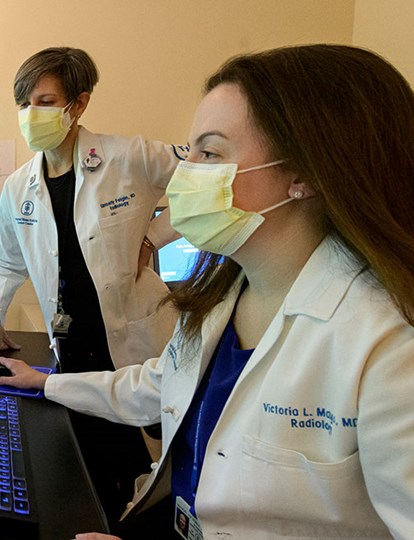Radiology Opportunities
Department Specialties
Explore some of our Radiology opportunities below.
Body Imaging
The Body Imaging team is the largest group in the Department of Radiology.
We use cross-sectional modalities (CT, MRI, and ultrasound, each with a senior director) and Disease Management Team–based subspecialty expertise to care for people with cancers of the chest, abdomen, pelvis, and extremities.
Breast imaging
The faculty members of the Breast Imaging Service are pioneers in the implementation of new imaging technologies and procedures for people with suspected or diagnosed breast cancer. The tests and procedures they perform include breast MRI, tomosynthesis, percutaneous breast biopsy, and radioactive seed localization.
Interventional Radiology
The Interventional Radiology Service provides comprehensive care for its patients, from clinical consultation to diagnostic and therapeutic procedures to post-procedure follow-up.
We have access to the most sophisticated imaging modalities, including MRI and PET, to perform complex procedures and pioneer new solutions, including tumor ablation and embolization.
Molecular Imaging and Therapy
The Molecular Imaging and Therapy team uses molecularly targeted probes and sophisticated imaging technology to detect and treat cancer. We offer the full range of established nuclear medicine procedures and are leading the development of novel technologies for PET and optical imaging.
We work closely with the Radiochemistry and Imaging Sciences Service, the Molecular Imaging and Therapy Service to advance novel imaging and therapeutic agents from preclinical research to clinical practice.
Neuroradiology
This group of subspecialists consists of experts in head and neck, spine, and brain imaging. We use fMRI extensively in clinical care and research. Our research portfolio includes work in radiogenomics, among many other areas.
Radiochemistry and Imaging Sciences
The Radiochemistry and Imaging Sciences team is dedicated to the development, design, translation, and application of new molecular imaging probes.
The faculty has broad representation from basic science disciplines and includes radiochemists, biologists, biochemists, medicinal chemists, and engineers.
Body Imaging
The Body Imaging team is the largest group in the Department of Radiology.
We use cross-sectional modalities (CT, MRI, and ultrasound, each with a senior director) and Disease Management Team–based subspecialty expertise to care for people with cancers of the chest, abdomen, pelvis, and extremities.
Breast imaging
The faculty members of the Breast Imaging Service are pioneers in the implementation of new imaging technologies and procedures for people with suspected or diagnosed breast cancer. The tests and procedures they perform include breast MRI, tomosynthesis, percutaneous breast biopsy, and radioactive seed localization.
Interventional Radiology
The Interventional Radiology Service provides comprehensive care for its patients, from clinical consultation to diagnostic and therapeutic procedures to post-procedure follow-up.
We have access to the most sophisticated imaging modalities, including MRI and PET, to perform complex procedures and pioneer new solutions, including tumor ablation and embolization.
Molecular Imaging and Therapy
The Molecular Imaging and Therapy team uses molecularly targeted probes and sophisticated imaging technology to detect and treat cancer. We offer the full range of established nuclear medicine procedures and are leading the development of novel technologies for PET and optical imaging.
We work closely with the Radiochemistry and Imaging Sciences Service, the Molecular Imaging and Therapy Service to advance novel imaging and therapeutic agents from preclinical research to clinical practice.
Neuroradiology
This group of subspecialists consists of experts in head and neck, spine, and brain imaging. We use fMRI extensively in clinical care and research. Our research portfolio includes work in radiogenomics, among many other areas.
Radiochemistry and Imaging Sciences
The Radiochemistry and Imaging Sciences team is dedicated to the development, design, translation, and application of new molecular imaging probes.
The faculty has broad representation from basic science disciplines and includes radiochemists, biologists, biochemists, medicinal chemists, and engineers.

